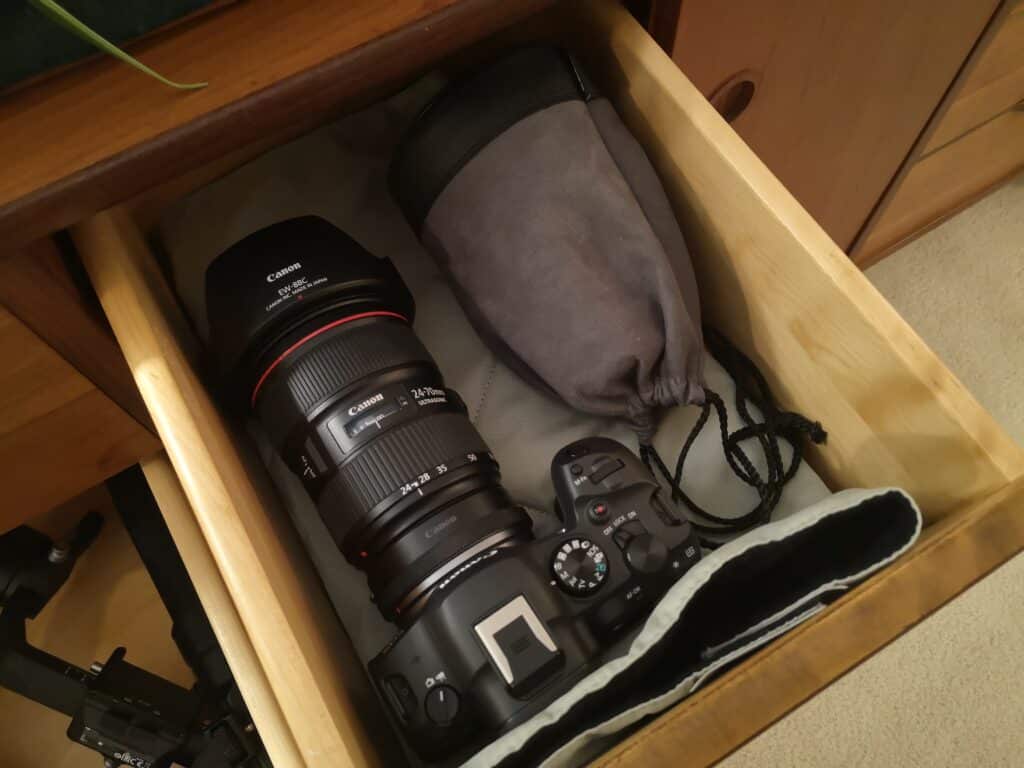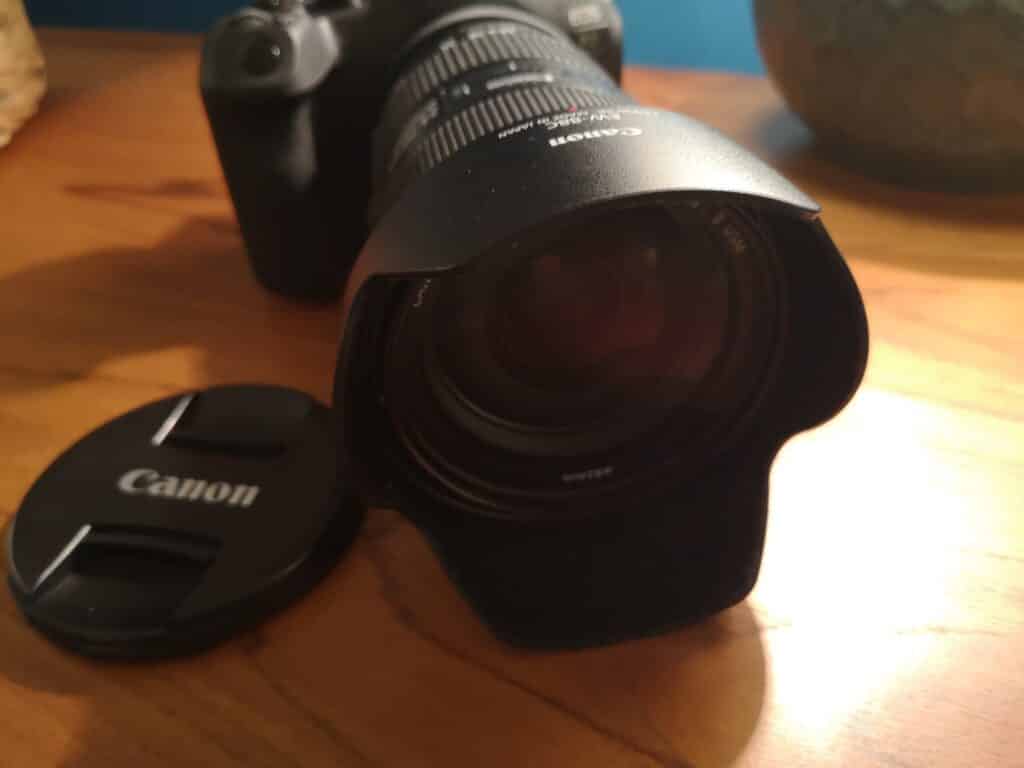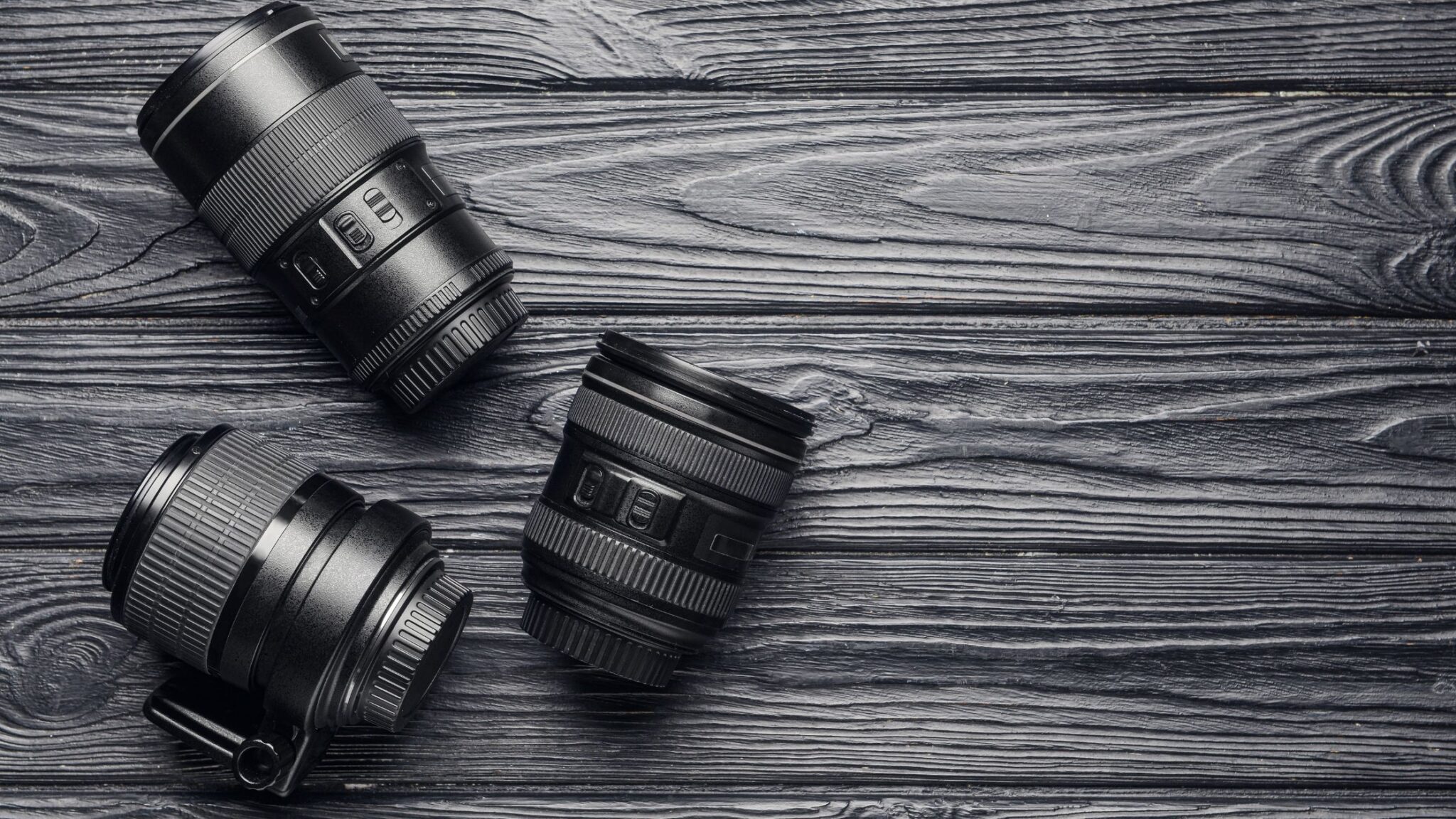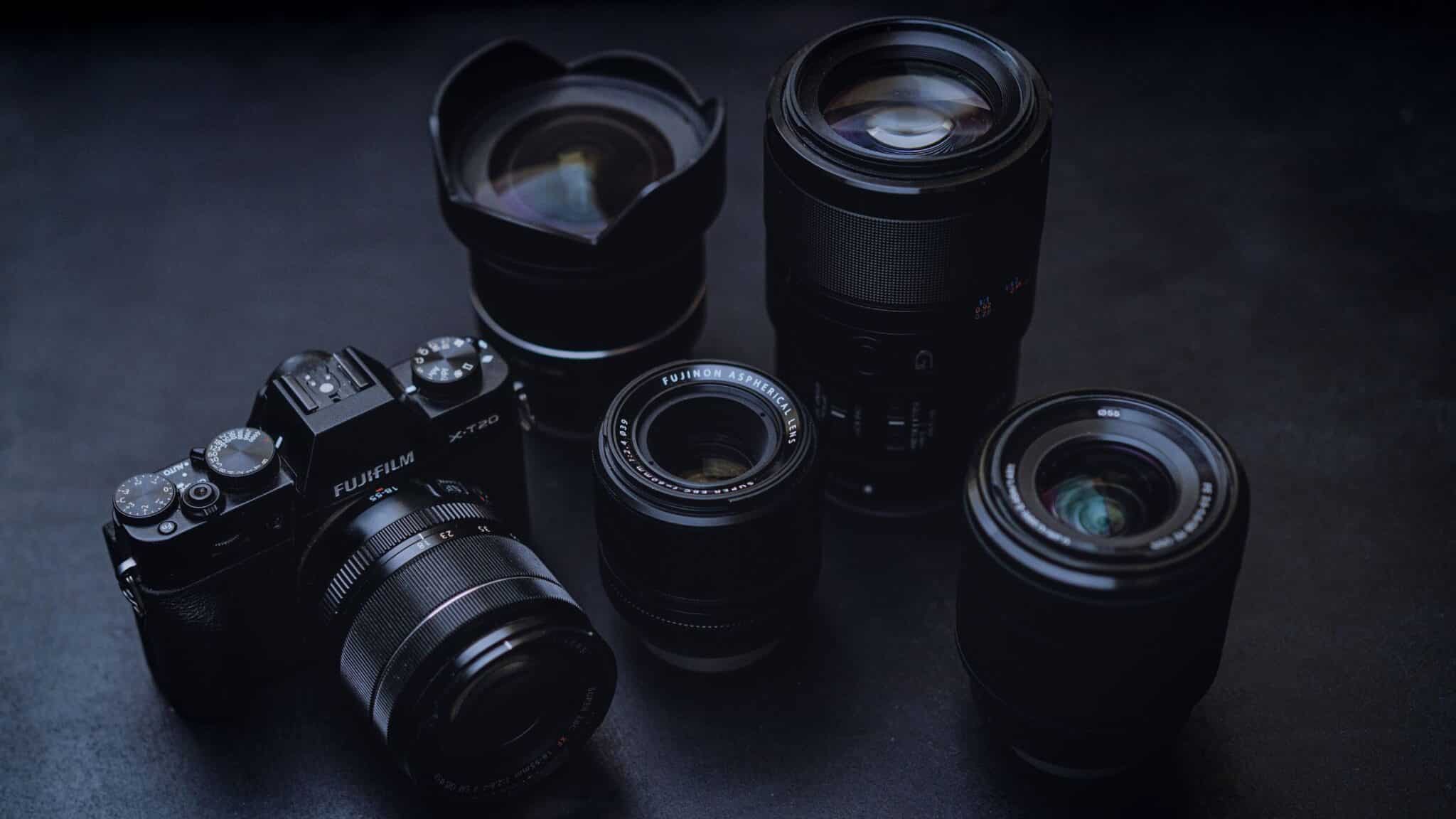[ If you buy gear from one of our links, we may make a commission at no cost to you. Thanks for supporting the blog—we appreciate you! Learn more. ]
How To Store Camera Lenses
Written by Colette Nichol, Solo Filmmaker and Story Strategist
Estimated reading time: 8 minutes
As a filmmaker and video producer, I know that if I don’t keep my lenses safe, they’re going to get damaged and cost me money! And that’s not something I want. However, storing these valuable assets can often be a challenge. In this blog post, I’ll briefly cover common challenges we all face in lens storage plus 10 practical tips on how to store your camera lenses effectively.
Quick Lens Storage Tips
If you just want one basic tip on lens storage it’s this: keep your lenses away from young children, mold, dampness, and dust.
And make sure that they can’t be easily knocked over or damaged. You can store them standing up inside a cabinet or drawer with the glass facing down. Naturally, you MUST have the lens cap and the back cap on preventing any dust from entering the lens.
You can also store your lenses on their side in nicely padded drawers. I do both.
The only time you get into serious trouble with lens storage is in the tropics. That’s when you absolutely must have a dry cabinet to keep your lenses from being damaged by the constant humidity.

Common Challenges in Lens Storage
Photographers and video shooters often struggle with finding the right balance between accessibility and protection when storing lenses.
It kind of sucks to have all your lenses tucked away where they can’t be damaged, but then you also can’t really access them easily. There needs to be a balance.
Lenses are delicate. Your lens can get damaged by environmental factors like dust, moisture, and extreme temperature fluctuations. But the need for quick access can sometimes lead to storage practices that put lenses at risk.
DRAWERS & CABINETS
I recommend using drawers that are easy for adults to open but maybe not so easy for kids to open. As well as cabinets. I’ve had my lenses on open-air shelving as well. When I keep my lenses out like that, I make sure to dust them (yes, really) every week. And I also use them frequently.
As long as you store your lenses with the front and back caps on and away from humidity and flying objects or sticky fingers, you don’t need to worry.
Why Proper Storage Matters
Proper storage is important for maintaining the longevity and performance of your lenses.
You want to prevent lens elements from warping, experiencing fungal growth, and getting scratched or dusty. Well-maintained lenses perform better and also have a higher resale value.
As a side note, I always recommend using a lens filter and a lens hood if you’re even remotely accident prone – which I am. Because one single scratch on your lens, and you’re f**ked. You will lose a lot of resale value on a lens if it’s scratched. And if you drop your lens without a hood on, it’s way more likely to be damaged.

I always use a lens hood and lens filter to protect my lens from my own darn clumsiness.
10 Tips on How to Store Your Camera Lenses
1. Use Silica Gel Packs: These help in reducing moisture, a primary cause of fungal growth in lenses. This is only important if you feel like you might have a mold problem in your house.
2. Invest in Padded Storage: Use padded cases or compartments to protect lenses from shocks and vibrations. Or get a cabinet or drawer unit for your camera gear.
3. Store Lenses Vertically When Possible: This minimizes stress on the lens elements and mount. But for your everyday grab-and-go camera, don’t bother with this. Just leave it out with the lens on ready to go!
4. Keep in a (Somewhat) Controlled Environment: Avoid extreme temperatures and humidity, but don’t sweat it if your house gets a little bit hot or cold. These lenses are hardy!
5. Use Lens Caps: Always put the front and rear lens caps on when not in use. I mean, really. ALWAYS. You don’t want anything inside your lens that shouldn’t be there!
6. Separate the Lens from the Body: It’s generally safe to store the lens attached to the camera, but for long-term storage, detach the lens to avoid stress on the camera mount.
7. Regularly Clean Your Gear: Before storage, gently clean the lens to remove dust and other nasties. I do this after any big shoot. Also, check your lens to make sure it’s not damaged. And don’t be silly like me and wait three years to get your lens fixed if it is damaged. You can send your lens to the manufacturer in many cases and get it fixed for much less than a new lens.
8. Avoid Sunlight: Store lenses away from direct sunlight to prevent lens coating damage.
9. Use a Humidity-Controlled Cabinet: If you’re in the tropics, this isn’t really optional. You don’t want your lens to get damaged because you didn’t splurge on a $300 cabinet. I mean really. But if you’re like me, and you live somewhere wet but not humid, don’t bother. No need!
10. Stay Calm: Don’t get all freaked out about storage. Just be logical and keep your lenses somewhere that they won’t get knocked over. Most people (even pros) don’t lose their mind over lens storage. A photographer friend of mine who has been a pro for 25 years just keeps all her gear on her desk—sitting out in the open air where her cat may choose to use it as a chin rest. And, her photographers are amazing! So, really, it’s all relative. How you organize your gear is up to you. Whatever you do, don’t store your gear so beautifully that you never use it.

Common Questions
How do you store a camera lens when not in use?
Store your lenses in a padded case or compartment. If you’re feeling fancy and have a minor mold problem you can add silica gel packs. Always keep your lenses away from extreme temperatures i.e. don’t store them near a fire place!
Should you store camera lenses up or down?
Some people recommend storing your lenses vertically (up or down) to minimize stress on the lens elements. But I don’t really think it matters. You put way more stress on your lens when you’re out shooting than when it’s sitting in a drawer. If you’re going to store your lens standing up, then put the glass side down and make sure the lens cap is on.
What is the best way to store your lenses?
The best way to store lenses is in a controlled environment using padded cases, with caps on, and preferably in a humidity-controlled cabinet if you’re in the tropics.
Where is the best place to store camera lenses?
A dry, temperature-controlled environment, away from direct sunlight, mold, water, dust and children. I like to store my lenses in drawers and cabinets away from prying hands and so it’s impossible to knock them over.
How do you store lenses without a hard case?
I don’t store my lenses in a hard case. But if I had expensive cinema lenses, you best believe those guys would be in a case! Instead, just make sure your lenses are in a clean, dry, and stable environment. Use soft lens bags if cases are not available. And put padding in your drawers if you’re placing in drawer box. Add felt to the bottom of cabinets if you want to make them a little more cozy.
Is it OK to leave the lens attached to the camera?
For short periods, or if you use the camera/lens combo all the time, yes! Most photographers and video shooters always have a camera with a lens attached just lying around. Cause sometimes you just want to grab and go. But for long-term storage, detach the lens to prevent strain on the camera mount.
Also storage is easier and takes up way less space when you don’t have them attached.

Final Thoughts
Remember, the way you store your lenses and treat your lenses during a shoot can impact their lifespan and performance.
By following these tips, you can ensure that your lenses remain in top condition.
Happy shooting (and storing)!
More Articles
⭐ How To Store Filmmaking Gear
⭐ The Best Lens For Video Hands Down
⭐ The Ultimate Guide to the BEST Canon Lens for Video

About the Author
Hi! I’m Colette Nichol. I’m a solo filmmaker and story strategist based out of rainy Vancouver, Canada. I’ve been making videos and micro films for small businesses and global brands since 2014.
Plus, I LOVE to help aspiring filmmakers pursue their dreams and start making films. This blog is designed to help you gain the knowledge you need to become a filmmaker.
If you want more, get on the waitlist for the Story Envelope Academy Solo Filmmaking Mentorship Program. It opens up one time per year and is the best way to become a filmmaking or video pro fast!
CLICK HERE to get on the solo filmmaking mentorship waitlist.